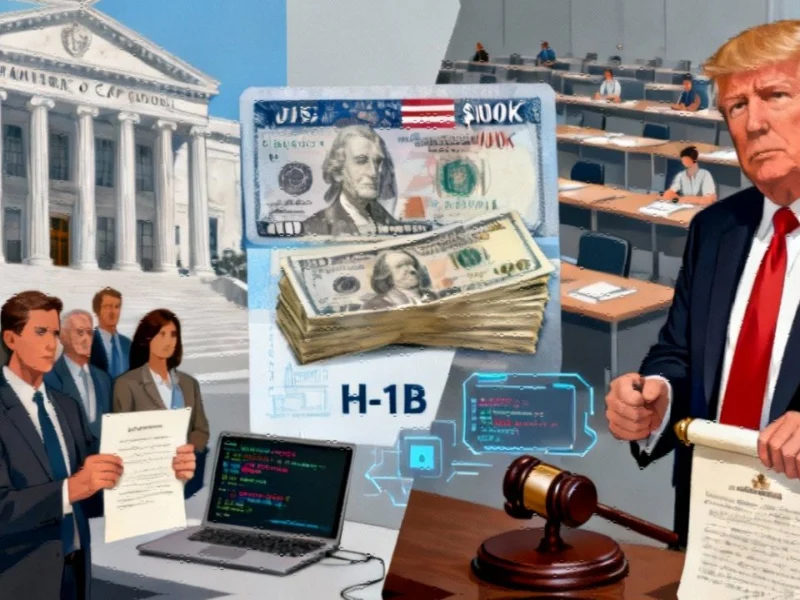Business Coalition Challenges Presidential Visa Fee Authority
The U.S. Chamber of Commerce has initiated a significant legal challenge against the Trump administration’s recent proclamation imposing a $100,000 fee on H-1B visa applications. The lawsuit alleges the president exceeded his statutory authority by creating what amounts to a financial barrier for companies seeking specialized international talent.
The legal filing targets both the Department of Homeland Security and Department of State, arguing that the proclamation disrupts the careful balance Congress established in immigration law. According to the Chamber’s legal team, the fee represents an unauthorized exercise of presidential power that contradicts legislative intent and established immigration frameworks.
Historical Context and Program Significance
The H-1B visa program traces its origins to the Immigration and Nationality Act of 1952, designed specifically to address shortages in specialty occupations requiring advanced technical knowledge. The program has served as a critical pathway for numerous technology leaders, including Microsoft CEO Satya Nadella and Zoom founder Eric Yuan, to contribute to American innovation and economic growth.
Recent industry developments highlight the ongoing importance of specialized talent in maintaining competitive advantage. The program has been particularly vital for technology companies facing well-documented shortages in STEM fields, where domestic graduation rates have failed to keep pace with industry demand.
Economic and Innovation Implications
The lawsuit emphasizes the program’s substantial economic benefits, noting that foreign-born STEM professionals contributed approximately $103 billion to American workers’ incomes between 2000 and 2015. The Chamber’s filing argues that restricting access to specialized talent through financial barriers could undermine American competitiveness in critical sectors.
This legal challenge comes amid broader market trends affecting technology recruitment and international talent acquisition strategies. The proposed fee could disproportionately impact smaller companies and startups that lack the financial resources of established corporations, potentially stifling innovation at its most vulnerable stages.
Legal Arguments and Constitutional Questions
Central to the legal challenge is the assertion that the proclamation violates the separation of powers by overriding congressional authority on immigration matters. The lawsuit contends that while presidents possess certain powers under the Immigration and Nationality Act, these cannot be used to create new visa conditions or override existing statutory frameworks.
The Chamber’s legal team argues that Congress has maintained active oversight of the H-1B program, regularly reviewing its implementation and adjusting provisions to prevent abuse while protecting American workers. The proclamation, they claim, disrupts this carefully balanced approach without legislative authorization.
Broader Industry Impact
Beyond the immediate legal questions, the proposed fee raises concerns about American companies’ ability to compete globally for top talent. Industries facing critical shortages, including healthcare with projected deficits of up to 139,000 physicians by 2033, could face additional challenges in staffing essential positions.
Recent related innovations in technology sectors demonstrate the ongoing need for specialized international talent. The lawsuit highlights how the fee could undermine American leadership in emerging fields, including artificial intelligence and advanced computing, where global competition for expertise continues to intensify.
Political and Policy Context
The legal challenge emerges against a backdrop of ongoing debates about immigration reform and border security. In a companion statement, Chamber officials acknowledged administration efforts to secure borders while arguing for comprehensive immigration reform that addresses both security concerns and economic needs.
The business coalition’s position reflects broader recent technology sector concerns about maintaining access to global talent pools while investing in domestic workforce development. The group advocates for balanced approaches that include both specialized visa pathways and enhanced educational initiatives to develop homegrown talent.
Implementation Challenges and Future Directions
If implemented, the $100,000 fee would represent one of the most significant financial barriers to skilled immigration in recent history. The Chamber’s lawsuit seeks both declaratory relief finding the proclamation unlawful and injunctive relief preventing its implementation.
As this legal battle unfolds, businesses continue to monitor how industry developments might affect their recruitment strategies and operational capabilities. The outcome could have lasting implications for how American companies access global talent markets and compete in increasingly internationalized industries.
The resolution of this case may also influence broader discussions about presidential authority in immigration matters and the appropriate balance between executive action and legislative oversight in shaping economic and workforce policies for the coming decades.
This article aggregates information from publicly available sources. All trademarks and copyrights belong to their respective owners.



